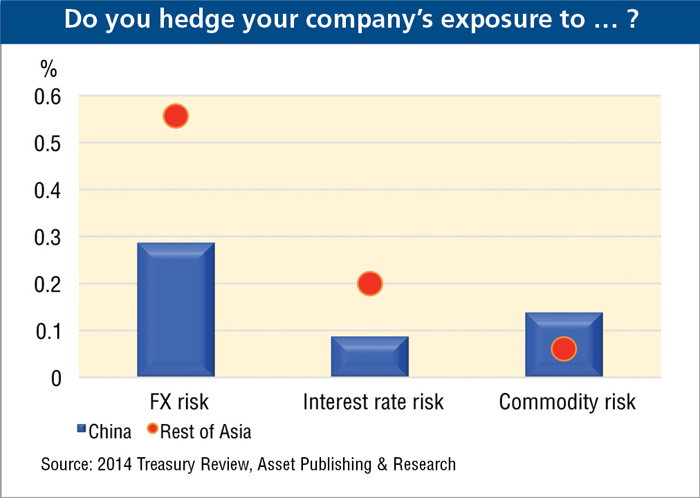 |
|
According to the State Administration of Foreign Exchange (SAFE), corporates are able to buy and sell a wider variety of renminbi and foreign exchange options and swaps for hedging purposes from August 1 onwards. The regulator has specified the options to be traded as common European options, meaning those that can only be exercised on the expiration date and not before.
Previously, corporates were only allowed to purchase forward contracts and call options to hedge their foreign currency exposure.
Beng Hong Lee, Deutsche Bank’s head of markets for China, says clients held back FX hedging partially as a result of the limited number of instruments available and unattractive pricing onshore. “Some corporates may not have a very big setup offshore and find it difficult to access the CNH market for hedging purposes,” he observes. “So with this development onshore, these corporates can now enjoy a broader set of tools to hedge as well.”
The relaxations allow for structured instruments that can lower the cost of hedging significantly. Two actively traded products in the wake of the reform include call spreads and capped forwards. In the former, a corporate buys a call option and sells an out-of-the-money call option, for instance when expecting the US dollar to appreciate further against the renminbi. The premium for the call option bought is partially offset by the premium income of the contract being sold.
Lee says buying a one-year call spread cuts the cost of hedging in half compared to a vanilla call option of that length that costs around 500 pips. Even cheaper, a capped forward is set up at zero cost to the corporate because the premium of a so-called off-market forward sold offsets the premium paid for an option bought.
He believes hedging activity among onshore Chinese corporates will rise as a result of the reform. Drawing from The Asset’s own survey of more than 400 corporate treasurers and CFOs earlier this year, less than 30% of Chinese companies hedge their FX risks (See graph).
Deutsche Bank executed 10 deals on the first day alone, Lee adds, covering corporate clients across chemical, coal, agriculture, and manufacturing industries. DBS China, HSBC and Standard Chartered, too, announced on August 1 they had executed new types of currency derivatives on behalf of their corporate clients.
The doubling of the currency’s daily trading band to 2% in March and the concerted effort to stop renminbi appreciation by the People’s Bank of China earlier in the year have made two-way exchange rate fluctuation a reality. The renminbi has depreciated around 2% against the US dollar since the beginning of 2014 after years of continued appreciation. As a result, requirements to hedge have increased.
“Chinese corporates are also increasingly going global,” adds Lee, “not only from an import and export perspective, but also in terms of direct investment and M&A. As a result, the foreign exchange risks of corporates have increased.”
The new financial instruments are expected to drive down the cost of hedging not only on the onshore market. They could impact prices in offshore markets, including Hong Kong and London, where renminbi daily spot FX trading volume has grown to about US$4.5 billion and US$2 billion a day, respectively.
“The development of an onshore options market also improves the pricing transparency of the entire renminbi complex,” relates Lee. “To a certain extent, as the onshore option market grows, the price discovery offshore will improve as well.”
Jacky Tai, managing director and head of treasury and markets, DBS Bank (China) believes onshore trading volumes will need to rise before any impact on offshore markets will be felt.
He also expects further deregulation to offer even more methods to hedge currency risks for corporates. “Going forward, relaxations in the form of reduced documentations and allowing exotic options might provide Chinese corporates with more flexibility when hedging against currency risk,” he says.
Meanwhile, Singapore Exchange is still on track to launch exchange-traded CNH and CNY futures later this month. They will compete with HKEx’s CNH/USD futures contracts, launched in September 2012 and the world’s first deliverable renminbi currency futures contract at the time.




.jpg)



